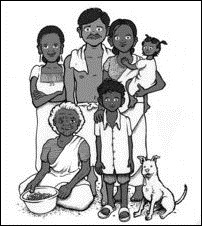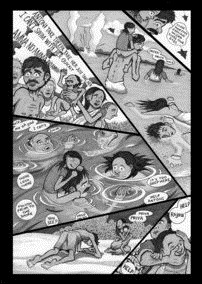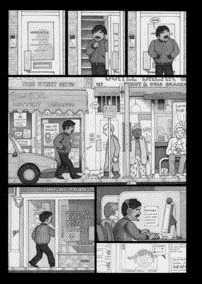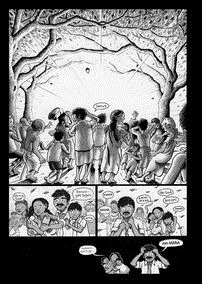Benjamin Dix, a former UN staffer who spent four years in Sri Lanka from 2004 till 2008 when Sri Lanka asked all NGOs to leave the island, and who with illustrator Lindsay Pollock, is documenting the effects of Sri Lanka war through the story of a Tamil refugee, in an interview given to TamilNet says, "I felt terrible after the UN evacuation from Vanni and very angry that they international system had abandoned civilians at their time of need….Due to the media blackout on the conflict, I felt that it was very important to tell the stories of the dead and the survivors of the conflict." Arundhati Roy, writes in support of Dix’s project, "tens of thousands of tamil civilians who were brazenly and brutally killed and powerful countries which have strategic and business interests in the region are rapidly burying these facts," and that the book will unbury these facts.
Full text of Benjamin Dix’s interview with TamilNet follows:
TamilNet: Four years is a long period you spent in Vanni – Can you describe how you spent your time while in the NorthEast?
Benjamin Dix: I arrived in Vanni a few days after the tsunami in 2004 and stayed until the UN evacuation in September 2008. At first I arrived to help a close friend of mine from university in London who was working Vanni for a German NGO. Although the area had just experienced a catastrophe of unimaginable magnitude, I was struck by the kindness and hospitality of the Tamil community in Vanni. Within the first day I met people who were immediately kind and generous and genuinely good people. I decided to stay and started working with Norwegian People’s Aid and developed the Tsunami Education Project, that educated school children and tsunami effected communities about the geography that created the tsunami. This was received with great positivity, and my team of geography graduates from Jaffna University implemented the project to over 50,000 people across Vanni.
 I then handed over the project to the Tamil team and went on to join the UN as the Communications and Liaison Officer. In that role, I visited all UN project sites across Sri Lanka but spent most of my time in Vanni. As the security situation spiraled from end of 2007 onwards, I stayed in Vanni and photographically recorded the multiple displacements of people and interviewed many people about the experiences they had gone through. These were very distressing stories of having to run from villages in the middle of the night as artillery shells rained down.
I then handed over the project to the Tamil team and went on to join the UN as the Communications and Liaison Officer. In that role, I visited all UN project sites across Sri Lanka but spent most of my time in Vanni. As the security situation spiraled from end of 2007 onwards, I stayed in Vanni and photographically recorded the multiple displacements of people and interviewed many people about the experiences they had gone through. These were very distressing stories of having to run from villages in the middle of the night as artillery shells rained down.
I stayed in Vanni until the UN evacuation on September 16th 2008. That was by far the worst day of my life. The sense of abandonment as we drove away from a community at a time when they were most in need of humanitarian protection is something that has profoundly affected me. It was a sense of shame, guilt and abandonment that still haunts me to this day. Watching over the next few months from the outside, the limited media coverage of the conflict, trying to spot people I new on the TV, was too much to bear.
 TamilNet: When did you conceive of this book project?
TamilNet: When did you conceive of this book project?
Benjamin Dix: I thought of the project in 2011 when I was coming to the end of my Masters degree in Anthropology of Conflict and Violence. I wanted to study conflict more but make the findings more accessible to a wider audience than just Sri Lanka experts and academics. I have enjoyed the medium of political graphic novels such as Palestine by Joe Sacco and Persepolis by Marjane Satrapi and thought that something along similar lines would work well on Sri Lanka. But I also wanted to make an educational tool that encouraged the reader to understand a wider concept of conflict and migration. Therefore I began to look at ways I could incorporate multi media to embed academic and journalistic writing, along with photographs and film clips to bring a ‘reality’ to the illustrations. By embedding all that material behind the illustrations I hope the reader will explore the many arguments and perspectives on conflict and forced migration on a global scale, not just Sri Lanka.
TamilNet: Did you feel a responsibility to expose what happened during your stay?
 Benjamin Dix: I felt terrible after the UN evacuation from Vanni and very angry that they international system had abandoned civilians at their time of need. I felt a sense of responsibility to the massacres as I had been working there and then left, that guilt was very hard, almost impossible to process. Due to the media blackout on the conflict, I felt that it was very important to tell the stories of the dead and the survivors of the conflict. People are now scattered across the globe, trying to come to terms with what happened and trying to rebuild their lives, but in new, alien environments. I cannot imagine what it must be like to not be able to return to my home and forever be in exile. This is the story that I am trying to tell in The Vanni through the voice of the protagonist, Antoni.
Benjamin Dix: I felt terrible after the UN evacuation from Vanni and very angry that they international system had abandoned civilians at their time of need. I felt a sense of responsibility to the massacres as I had been working there and then left, that guilt was very hard, almost impossible to process. Due to the media blackout on the conflict, I felt that it was very important to tell the stories of the dead and the survivors of the conflict. People are now scattered across the globe, trying to come to terms with what happened and trying to rebuild their lives, but in new, alien environments. I cannot imagine what it must be like to not be able to return to my home and forever be in exile. This is the story that I am trying to tell in The Vanni through the voice of the protagonist, Antoni.
TamilNet: When you left the Vanni, did you for see the killing that were to occur in Mu’l’livaaykkaal?
Benjamin Dix: I understood when we evacuated from Vanni that the war would be brutal but I could have never predicted just how brutal it would be. The systematic targeting of civilians and civilian infrastructure by the government forces was unprecedented and the silence by the international community was shameful and disgraceful. I am pleased to see that reports are now coming to light at the failings of the international systems, but it will tragically never bring back such a loss of life.
 TamilNet: Being a UN photographer you would likely have in your possession a wealth of photographs on life in the NorthEast. Will these photographs form a key part of your project?
TamilNet: Being a UN photographer you would likely have in your possession a wealth of photographs on life in the NorthEast. Will these photographs form a key part of your project?
Benjamin Dix: I have so many photographs of Vanni and all over Sri Lanka. It is a truly beautiful island and a pleasure to photograph. As previously mentioned, I will be using these photographs and film clips that I took to embed behind the illustrations so that the reader can see the real life stories.
TamilNet: From the website it is difficult to imagine the scope and size of your project. Can you give some additional details? Will this include any video clips not yet seen?
Dix: The story will unfold over eight chapters. Each of these will broadly examine a different stage of the conflict. For example, a chapter on displacement; another on life in the so-called no fire zone; another on Manik Farms, asylum in the UK, etc etc.
All of them will be revealed in retrospect, with Antoni telling the stories to different characters in London. The home office, considering his asylum case; in interviews with Nina, his asylum lawyer; in a support group for refugees; talking to his cousin in London; and reminiscing with Rajini (his wife) on Skype.
The video clips will largely be sourced from the material that Callum Macrae gathered for his film ‘Sri Lanka’s Killing Fields’, though we will not necessarily use the same material as him. There is a wealth of amateur footage, but we’ll be looking for footage directly relevant to Antoni’s journey and story. It is not journalism, per se – our use of video is intended to augment the comic panels with the tangible reality of the war, so that the real sights and sounds of the war resonate in the reader’s mind as they read our fictionalized interpretation.
TamilNet: Has the illustrator, Lindsay Pollock, been to the NorthEast? How did you both agree to collaborate on the project? The narrative is strengthened by accurate portrayal of Tamil cultural nuances that are part of civilian life. Are you the source of these, and if so, how did anthropology help in engaging with the locals?
Benjamin Dix: Lindsay has not visited Sri Lanka. We decided that visiting the country might be impractical; the areas in which the fighting took place are not easy to discretely visit, and besides, life there has materially changed since 2009. More importantly, we were concerned that our presence might cause problems for people who live there still, bringing scrutiny and possibly persecution if they were seen to have interacted with us.
Instead we visited Tamil Nadu. Lindsay was able to see, sketch and photograph flora and fauna a lot like that found in Sri Lanka, and to see Tamil villages with very similar buildings and lifestyles to those lived by Sri Lankan Tamils until the war. Otherwise, he will be working from photos, video and testimonies.
I have been connected with Sri Lanka for many years now, and feel qualified to research and arrange a narrative which accurately represents a ‘typical’ experience for a Tamil family between the tsunami (when I arrived in Sri Lanka) and the present day – knowing as I do, many survivors of the war including people seeking asylum in my own country, the UK. However, Lindsay and I are acutely conscious that we are not Tamil ourselves and do not have a nuanced understanding of Tamil culture and social interaction. Therefore we’re working with a small, close circle of Tamils who will check our writing and contribute ideas and notes, so that our characters behave realistically, and we don’t misrepresent the Tamil people or make any ignorant ethnographic errors.
TamilNet: Does your research at Sussex include Sri Lanka experience?
Benjamin Dix: At Sussex University I studied Anthropology of Conflict and Violence and used the Sri Lankan experience to highlight some of the essays that I wrote. Papers such as Humanitarian space, notions of terrorism and roots of conflict were papers that I wrote where I used Sri Lanka as a case study.
TamilNet: You have received endorsements from a remarkable set of people. Were they following your progress for some time? If not, did you have to provide additional information on your project?
Benjamin Dix: We have been blessed with the response that the project has received from influential figures in the media and human rights orgnisations as well as from ordinary Tamils and non Tamils alike. Because the war has been so under-reported, the circles of people who are engaged with the subject are quite small, so fortunately for us we have found it relatively easy to reach the public figures and influential groups who are concerned with the war. They have been very generous in supporting our contribution to the discussion.
TamilNet: Arundhati Roy says tens of thousands of tamil civilians who were brazenly and brutally killed and powerful countries which have strategic and business interests in the region are rapidly burying these facts. She adds that your book will unbury these terrible and sordid secrets. Do you agree with her characterization of your effort? Can you elaborate further on your aims in pursuing “the Vanni” project?
Benjamin Dix: It’s unquestionably true that many thousands of stories have gone untold, and tragically – as time passes and evidence deteriorates – many stories from the war will never be heard. In that respect we are certainly trying to unbury some of the unpalatable truths of the conflict. Our goal is to enlighten, to energise discussion and bring as many people as possible into the discussion. It’s important that it’s not only Sri Lanka experts who are engaged with this issue; if there’s going to be political progress, ordinary citizens and voters around the world need to be aware that Sri Lanka is more than just an island where you go for your honeymoon or who your team plays at cricket.
TamilNet: In the introduction you say, “it [the war] left a community destroyed and a country further fractured.” Please elaborate. How will you assess the chances of success of the West’s approach towards reconciliation?
Benjamin Dix: The introduction to the book is to give the reader with little or no understanding of Sri Lanka a context in which to read the graphic novel. A reader new to the subject should first understand why and how Sri Lanka came to the situation where two communities fought so fiercely. From that basis, the reader can then understand Antoni’s situation better and understand the story.
I will not be tackling the issues of reconciliation within the book – that is not the purpose of the book. The book will have links to many organisations, such as TamilNet, amnesty International, The Sri Lanka Campaign, ICG etc etc but the book will focus on the story of Antoni and his family through a narrative.
Benjamin Dix, the author, agreed to provide TamilNet another interview on his political views of the conflict, and expressed his desire to keep the current exchange cover the book project and the effect of the war on the civilian population.
External Links:
BD:
BD:
(For updates you can share with your friends, follow TNN on Facebook and Twitter )
